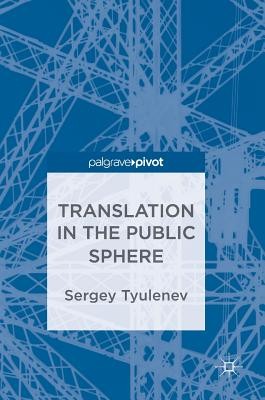
- We will send in 10–14 business days.
- Author: Sergey Tyulenev
- Publisher: PALGRAVE PIVOT
- ISBN-10: 3319783572
- ISBN-13: 9783319783574
- Format: 14.8 x 21 x 1 cm, hardcover
- Language: English
- SAVE -10% with code: EXTRA
Reviews
Description
This book brings together the study of translation with public sphere theory, in order to discuss social communication as it really happens. Through illuminating examples and case studies, translation is shown to be a mediating mechanism in all public debate conducted both within one society and between societies. The author offers a detailed discussion of the kinds of translation most relevant to public sphere communication and their properties. Throughout, he argues persuasively that it is impossible to study the public sphere without taking account of translation in it, and that the interaction between the public as a collective inevitably involves translation. Further, the author suggests new methodological approaches to studying not only translation in the public sphere but public debate itself as a kind of translation. Building on the achievements of both the public sphere scholarship and Translation Studies, this work fills a significant lacuna in existing literature and will set the agenda for future studies at the intersection of the two. It will provide an invaluable resource for scholars and students of the public sphere and translation, as well as academics in the broader fields of sociology, political science and communication.
EXTRA 10 % discount with code: EXTRA
The promotion ends in 20d.18:21:57
The discount code is valid when purchasing from 10 €. Discounts do not stack.
- Author: Sergey Tyulenev
- Publisher: PALGRAVE PIVOT
- ISBN-10: 3319783572
- ISBN-13: 9783319783574
- Format: 14.8 x 21 x 1 cm, hardcover
- Language: English English
This book brings together the study of translation with public sphere theory, in order to discuss social communication as it really happens. Through illuminating examples and case studies, translation is shown to be a mediating mechanism in all public debate conducted both within one society and between societies. The author offers a detailed discussion of the kinds of translation most relevant to public sphere communication and their properties. Throughout, he argues persuasively that it is impossible to study the public sphere without taking account of translation in it, and that the interaction between the public as a collective inevitably involves translation. Further, the author suggests new methodological approaches to studying not only translation in the public sphere but public debate itself as a kind of translation. Building on the achievements of both the public sphere scholarship and Translation Studies, this work fills a significant lacuna in existing literature and will set the agenda for future studies at the intersection of the two. It will provide an invaluable resource for scholars and students of the public sphere and translation, as well as academics in the broader fields of sociology, political science and communication.


Reviews